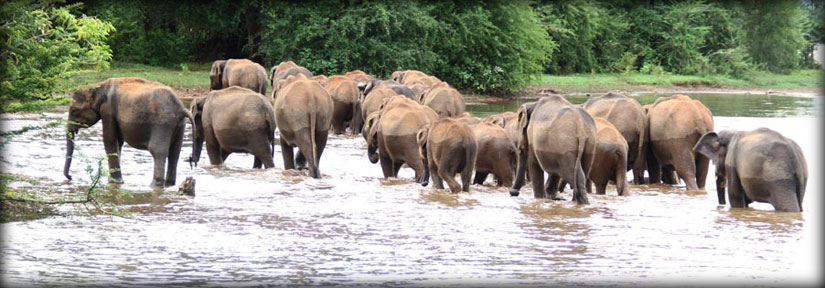|
National Environment Week:
ETH: A haven for orphaned elephants
 In 1995, the Department of Wildlife Conservation initiated a major
step for the welfare and conservation of orphaned baby elephants. It
established a place called Ath Athuru Sevana (Elephant Transit Home/ETH)
in the Udawalawe National Park. The brains and mastermind of this great
initiative is Dr Nandana Atapattu former head of the division of Wild
Animal Health at the Department of Wildlife Conservation. Within short
period the ETH showed that it is one of the most successful programmes
of wild animal rehabilitation in the world. In 1995, the Department of Wildlife Conservation initiated a major
step for the welfare and conservation of orphaned baby elephants. It
established a place called Ath Athuru Sevana (Elephant Transit Home/ETH)
in the Udawalawe National Park. The brains and mastermind of this great
initiative is Dr Nandana Atapattu former head of the division of Wild
Animal Health at the Department of Wildlife Conservation. Within short
period the ETH showed that it is one of the most successful programmes
of wild animal rehabilitation in the world.
Since then many orphaned babies have been brought to the ETH, and
most of them have been re-introduced back into the wild to enjoy their
natural lifestyle.
Location
The ETH is situated on the western border of the 33,000 hectare
Udawalawe National Park. It is adjacent to the huge “Udawalawe
Reservoir”.
There are no boundaries for the baby elephants and they have freedom
to roam where ever they want and wild elephants can visit ETH premises.
Please do not forget to spare a few moments, and turn off at Uda Walawe
into ETH on your way to Kataragama or Yala.
Feeding times and
upkeep at ETH
The Transit Home is a lively place. Feeding the calves with milk
happens every three hours throughout the 365 days of the year. Public
viewing of the feeding is permitted daily at 9am/ 12noon/ 3pm and 6pm.
Objective of ETH
|
Foster Parents scheme
for Elephants
You too can be the guardian angel of baby
elephants who have lost the love and affection of their
parents. You will have the opportunity of giving your choice
of name to the baby elephant you will be ‘adopting’. You
will also get many benefits and privileges from the
Department of Wildlife Conservation. For further details
contact Ath Athuru Sevana, Udawalawe (Elephant Transit Home)
on 047-2232147. |
The main objective of ETH is the rehabilitation of orphaned baby
elephants in order to introduce them back to the wilds. Prior to release
the vets have to be satisfied with their ability to live independently;
Success stories
Thamali was a female baby elephant rescued from the village called
Thambalagamuwa, situated in the Eastern region of the country, between
Trincomalee and Kantale. Poor little Thamali was a war victim. When the
tragedy occurred she was about four years old and quite playful.
Handicapped Elephant – Namal
Namal is a 4 -5year old elephant living at ETH. He was found
abandoned as an infant with a snare injury on his hind leg. As the
injury was really bad, after many attempts to save the foot, it was
finally decided that amputation was the only solution.
Once the aftercare was done and the wound was healed, Namal had a
prosthetic foot done for him. As Namal keeps growing, and with the wear
and tear, the vets need to keep re-doing his prosthetic foot.
Unlike the other elephants at ETH poor little Namal can never be
rehabilitated, due to this injury which was caused by humans to a
perfectly normal baby elephant. Today he is paying a heavy price due to
the human-elephant conflict. As Namal keeps growing, and with the wear
and tear of the shoe, new shoes will have to be done. It is a long term
commitment to be able to keep Namal as healthy and comfortable as
possible. Whatever support that can be extended in the ways of
expertise, financial support would be a great help to be able to keep
little Namal happy.
Rehabilitation Program, Monitoring and Follow up
Since the inception of ETH, over 100 elephants have been
rehabilitated. Once a batch of elephants is released, they are closely
monitored. At first at very close intervals, and gradually once ETH
monitoring staff realizes, that these elephants are settling well into
the new surroundings, the monitoring process is weaned off.
Sponsorship
(Foster Parents)
of Orphaned baby calves
To take the burden off the government on the funding of ETH, and to
give animal lovers a chance to sponsor and be involved in the growing
stages of calf elephants for a few years - there is a “Foster Parent
scheme” in place. The cost is appoximately LKR 25,000 per month, which
an individual, a company, an association, a school or even a group of
friends can undertake. Several benefits are offered to Foster Parents.
One is that you are able to give the little calf a name of your choice.
Many companies have joined this program. We spoke to Hemas Green Club
(part of the Hemas Holding CSR program) which has adopted a baby
elephant named ‘Abhiman’. He was brought to ETH from Ampara last year.
It was approximately three months old when wildlife authorities found
this calf trapped in the Kopavali tank in Ampara. Initially, the
wildlife dept named it ‘KOLI’ to depict the area it was captured,
however, after Hemas agreed to sponsor the elephant they named it
Abhiman to depict the Hemas called Abhimana.
This initiative is by the staff of Hemas through their Green Club.
The necessary funds are raised by the staff. The intention is to
support ETH on their ongoing programs and promote many others to do so
in order to conserve our wild elephants. Hemas is also helping to
develop the ETH website to attract more donors. |

